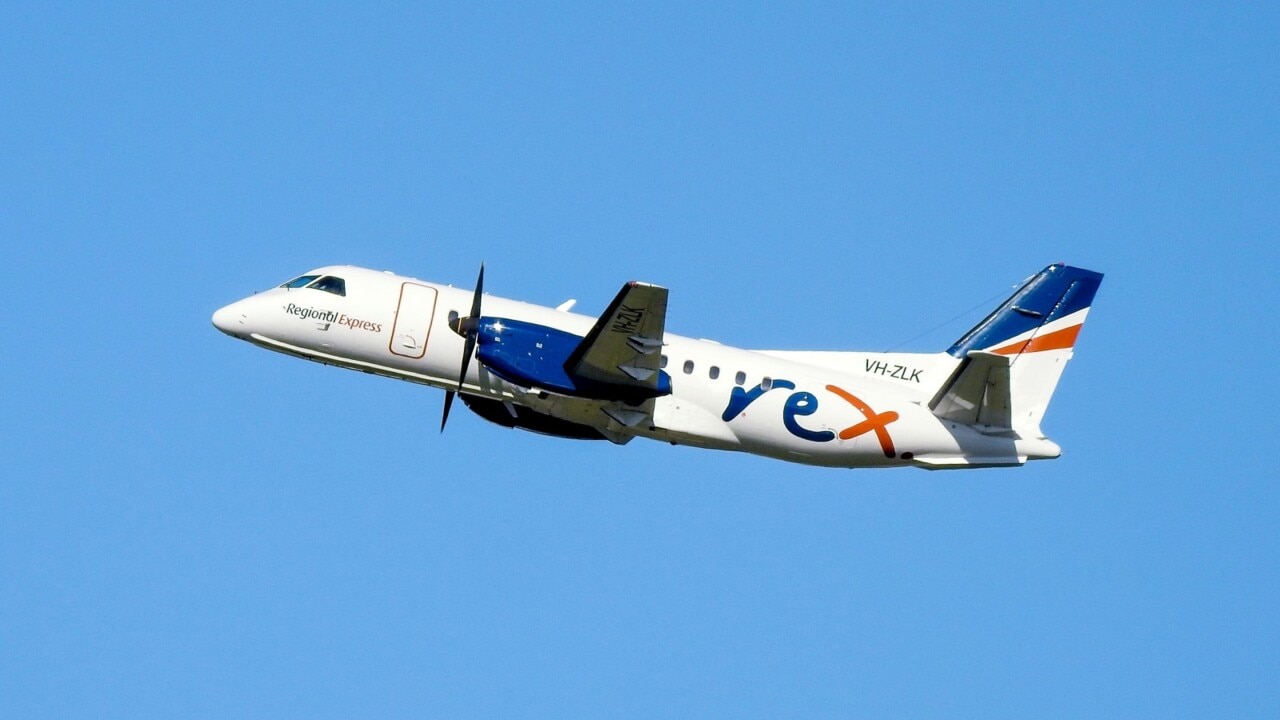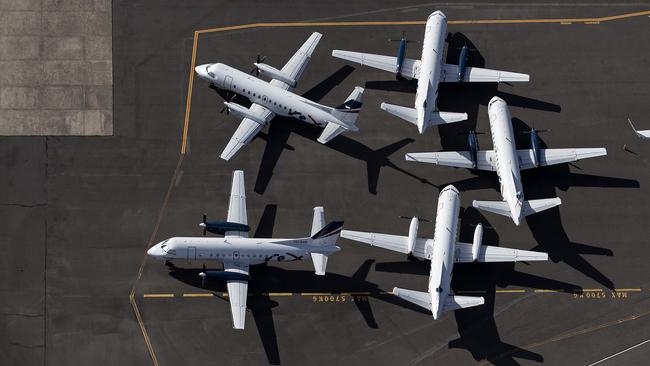Rex’s ageing Saab fleet another threat to regional flights with dozens out of action
Relief over the continuation of Rex’s regional services may be short-lived, as the aircraft used for those flights near their use-by date.

The continuation of Rex’s regional services may only be temporary, as the Saab 340s used on those routes increasingly fall into a state of disrepair.
Administrator EY has secured loan funding to ensure regional flights continue while a buyer is sought for Rex.
But any buyer will have to be prepared to fork out for extensive maintenance on the ageing Saabs or invest in replacement aircraft.
Currently, 25 of the 57 Saabs used to provide vital connections throughout Australia, are parked at airports, awaiting engine or other parts and maintenance.
EY partner Sam Freeman said the 32 aircraft available for flying were sufficient to operate the regional network, but it was unclear for how much longer they would remain airworthy.
“We hope to avoid as much disruption there as possible, but there will be planes that are experiencing having engine replacements and maintenance issues that will see them in various airport hangars around the country,” said Mr Freeman.
He conceded that one of the reasons for Rex’s descent into insolvency was the supply chain issues for the Saabs along with a pilot shortage, that meant regional services were pared back.
Central Queensland University aviation lecturer Doug Drury said to have so many aircraft parked was an unsustainable situation.
“25 aeroplanes on the ground is money out the window,” said Professor Drury.
“If they’re taking parts off one to keep another floating, something is definitely amiss.”
He said maintenance on turboprops was expensive, and the conditions involved in regional flying typically meant more work was needed on aircraft than jets operating city routes.
“Flying to regional airports is challenging because the landing areas are a bit shorter so you’re harder on the brakes, and you can get a lot of sand particles, dust blowing in from the Simpson that can get into the engine,” Professor Drury said.
“They’re hard to maintain in those environments, but it makes more financial sense to spend the money and get them back in the sky which is the only place they’re going to generate revenue.”

It appeared that a new owner of Rex would need to invest heavily in the Saab fleet which was already more than 30-years-old, given no orders had been placed for replacement aircraft.
Professor Drury said turboprops were “pretty pricey” and in relatively short supply.
“Given that’s the situation, I think (a new owner) will do their best to keep the Saabs up and running the best they can,” he said.
Broken Hill councillor Darriea Turley, president of Local Government NSW, said it was apparent to anyone who flew on the Saabs that their “end date was coming soon”.
Cr Turley said it was a relief to residents that the federal government and administrators were committed to maintaining regional services, but they were “curious” about the fleet issues.
“Everyone is invested in this administration and everyone is watching closely,” said Cr Turley.
“To lose the services we currently have with Rex, would mean having to do a 1100km round road trip to Adelaide. That would put enormous pressure on families, and take people away from work.”
She said Rex passengers from Broken Hill were typically not tourists, but people in need of medical services in Adelaide, or going to and from boarding school.
“We’re just watching things very closely. Everyone’s got their fingers and toes crossed. It’s so important to us to have those regional flights,” Cr Turley said.
Administrators were talking to current investors in Rex, including Asian investment firm PAG, but also expected interest from other parties.
Virgin Australia was quick to rule out taking on Rex’s regional operations, with chief executive Jayne Hrdlicka telling the ABC they would be sticking to 737 services.
“We are very efficient in operating our 737s, and we intend to stick to our knitting,” Ms Hrdlicka said.
It was expected Virgin Australia would take over the leases on three of Rex’s now grounded 737s, to provide more capacity in the fleet which has been affected by Boeing’s production delays.
“That will enable us to bring on more employees from Rex into our business,” Ms Hrdlicka said. “But that’s the extent of the envelope.”






To join the conversation, please log in. Don't have an account? Register
Join the conversation, you are commenting as Logout